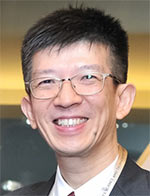Member Highlights: Dr. Haizhou Li

 Dr. Haizhou Li; Presidential Chair Professor, Associate Dean (Research), School of Data Science, The Chinese University of Hong Kong (Shenzhen), Adjunct Professor, Department of Electrical and Computer Engineering, College of Design and Engineering, National University of Singapore, Singapore.
Dr. Haizhou Li; Presidential Chair Professor, Associate Dean (Research), School of Data Science, The Chinese University of Hong Kong (Shenzhen), Adjunct Professor, Department of Electrical and Computer Engineering, College of Design and Engineering, National University of Singapore, Singapore.
Dr. Li is a Singaporean scientist, and a Chinese Teochew native. He is now a Presidential Chair Professor at the School of Data Science, The Chinese University of Hong Kong, Shenzhen, China. He did his Ph.D in digital signal processing of speech in 1990, and spent the past three decades to refine the technology. He has lived in China, France, Germany and Singapore, and visited many places, that has broadened my horizons. Many people he met around the world in the signal processing community have become his research colleagues, and friends for life. As a scientist, he pioneered the studies on multilingual speech processing, and neuromorphic computing. As a technologist, he was the architect of major speech technology deployments in Lernout & Hauspie, Baidu, Singapore Changi International Airport among others. As a technical leader, he has served as the Editor-in-Chief of IEEE/ACM Transactions on Audio, Speech and Language Processing (2015-2018), the President of the International Speech Communication Association (2015-2017), and the General Chair of the 47th IEEE International Conference on Acoustics, Speech and Signal Processing (ICASSP) in 2022. For the outstanding contributions to human language technology that have empowered the industry and benefited the Asian society, he was awarded the 2013 President’s Technology Award, the highest honor in the Republic of Singapore for science and technology. He is a Fellow of the IEEE, and the Academy of Engineering Singapore.
We approached Dr. Haizhou Li with a few questions to learn more:
1. Why did you choose to become faculty in the field of signal processing?
I studied radio engineering in 1980 during my undergraduate study, that was the time when the first digital signal processors were introduced. I shared the excitement with many other young students because we see many possibilities with digital signal processing. One of them is to enable machines to listen and to speak. I therefore chose speech processing as my graduate research topic, which is a topic I hold dear to my heart till today.
2. How does your work affect society?
I see myself more an engineer than a scientist. I advocate use-inspired research to make technology more accessible and usable for people’s life. In particular, I promoted the research of Asian languages processing in the research community when Asian languages are not given enough attention in early 90s. In 1998, I co-founded the biannual International Symposium on Chinese Spoken Language Processing, that has served the community for over two decades. I also pioneered scientific research that enables industrial deployment in Asia, that includes the Apple's Chinese Dictation Kits for Macintosh (1996), Lernout & Hauspie's Speech-Pen-Keyboard Text Entry Solution for Asian languages (1999), TELEFIQS voice-automated call centre service in Singapore Changi International Airport (2001), voiceprint engine for Lenovo A586 Smartphone (2012), and Baidu Music Search (2013). I believe that the technology is useful when it enhances our humanity and makes our lives better.
3. What challenges have you had to face to get to where you are today?
Speech processing can be just a signal processing research. However, to deploy speech processing technology in practical applications, multi-disciplinary knowledge from acoustics, linguistics, computer science is required. I constantly challenge myself in a continuous learning to broaden my knowledge. I have learnt multiple spoken languages because they help me perform better research. I have also learnt multiple programming languages to keep myself up to date with the scientific progress.
4. What advise would you give to scientists/engineers in signal processing?
With signal processing, we make changes to the signals to improve the transmission, we understand the signals to make good use of them. Signal processing is the science behind our digital life. However, it is a field that started before the emergence of digital techniques, and machine learning algorithms. While the major scientific problems remain the same, the solutions to signal processing develop rapidly, that have enabled many innovative services and products. Signal processing is a scientific discipline in its own right that prompts the scientists to discover new knowledge. Signal processing is also the enabling technology for many of what we do today, such as speech recognition, face recognition, teleconferencing, and medical imaging. It calls for engineers to develop faster, better, and cheaper solutions for countless applications. Your limitation with signal processing – it is only your imagination.
To learn more about Haizhou Li, please visit his webpage.

